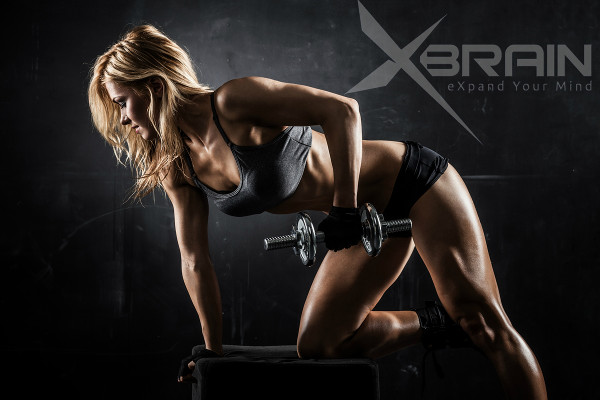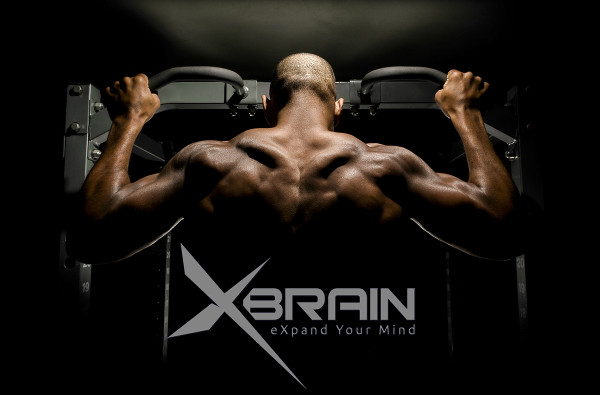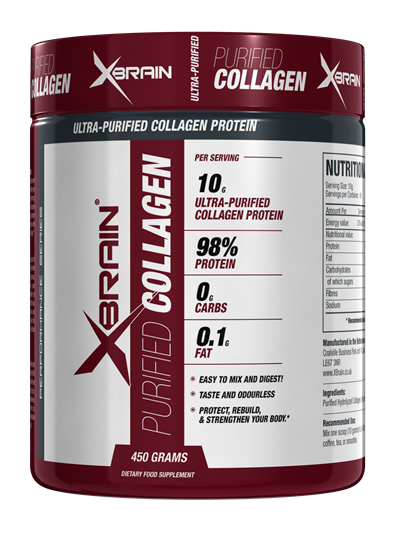
Collagen is an extremely abundant protein in connective tissue, so it is found in our joints, skin and bone. A collagen supplement is also an excellent source of amino acids; it contains all the essential amino acids, which cannot be synthesised by the body and have to be obtained from the diet, except for tryptophan. It is an especially good source of glycine, proline and hydroxyproline. As everybody knows, a high uptake of amino acids is necessary for maximum muscle gain. A collagen supplement will also provide the ideal ratios of amino acids to build up the collagen in your connective tissue. Scientists think that we start losing collagen around the age of 25. Eventually this leads to loss of joint flexibility, weaker bones, and other signs of aging.
As an athlete or a bodybuilder you are rightly concerned with gaining muscle and improving your lean muscle to fat ratio. However, you might be overlooking the importance of looking after your joints. Training places a lot of stress on them, which could lead to damage, which might prevent you training to your maximum capacity, and may even impact your future mobility. It really pays to look after your joints by ensuring that your body has all the amino acids it needs to replace collagen loss.
The collagen you take as a supplement doesn’t directly replace the collagen in your joints, skin or bones. The protein is digested in the stomach into amino acids. The body doesn’t ‘know’ which proteins the amino acids it gets in the diet come from. But the advantage of taking hydrolysed collagen is that it has the exact ratio of amino acids necessary for synthesising more collagen for connective tissue. It is not enough to simply take any amino acid. There are 20 amino acids in our proteins. Ten of these are essential; the body can’t make them and has to obtain them in the diet. If you are missing an essential amino acid that is found in a particular protein, your body can’t make that protein, even if you have plenty of all the other amino acids. Hydrolysed collagen therefore provides the amino acids necessary for making collagen proteins. Of course the amino acids can be used to make other proteins as well. However to ensure other proteins are synthesised efficiently it is best to stack several protein supplements, so that their amino acid profiles complement each other.

You also need to take a hydrolysed collagen supplement rather than the complete protein. The problem with taking a complete collagen supplement is that the protein is very big. We can’t absorb long polypeptides directly from the digestive tract; they have to be broken down by digestive enzymes before they can be absorbed. To be an effective amino acid supplement collagen therefore has to be hydrolysed, i.e. broken down into short peptides, which can be absorbed quickly from the gastric tract.
Collagen has an amino acid profile that is quite different from that of other popular protein supplements, such as whey protein. Particularly its proline content is interesting, since whey protein is rather low in proline. Collagen is therefore a good way to complement other protein supplements, to ensure that you have all the amino acids necessary for synthesising the proteins in your muscle.
Collagen obviously provides the perfect ratio of amino acids to synthesise more collagen. It is therefore helpful in maintaining joint and bone health, something that might get overlooked in the emphasis on muscle gain, but that shouldn’t be ignored. It is simply impossible to train hard, if your joints are weak and unhealthy. There is sound scientific evidence that shows that taking a hydrolysed collagen supplement is an effective way of looking after your joints. A 24-week study on the effect of collagen hydrolysate supplements in athletes found that it significantly reduced exercise-induced joint pain.
Apart from maintaining your joints in a healthy state, the amino acids obtained from collagen will help you maintain a positive nitrogen balance when you are training hard, which will allow you to build up muscle at an optimal rate. A high level of dietary amino acids is necessary both for the stimulation of maximum rates of protein synthesis, essential for building muscle, since muscle is made up of mostly protein, and to prevent the degradation of proteins in muscles for the use of the free amino acids for gluconeogenesis, to make glucose. Taking an amino acid supplement such as hydrolysated glycogen will provide the high levels of amino acids necessary to achieve that.

Collagen hydrolysate provides the correct amounts of amino acids necessary for the synthesis of collagen, the major protein making up the connective tissue in our joints, bones and skin. The supplement is especially rich in glycine, proline and hydroxyproline, amino acids that are found in high ratios in the sequence of collagen, and that are required in large amounts in its synthesis. A collagen supplement, therefore, will aid in the replacement of collagen lost from connective tissue and contribute to joint health. The high levels of amino acids will also stimulate protein synthesis and inhibit protein breakdown, maximising the muscle gain in the recover period after a workout. The hydrolysation process breaks up the very large collagen molecule into short peptides with high bioavailability, so they can be rapidly absorbed into the body and utilised efficiently.

